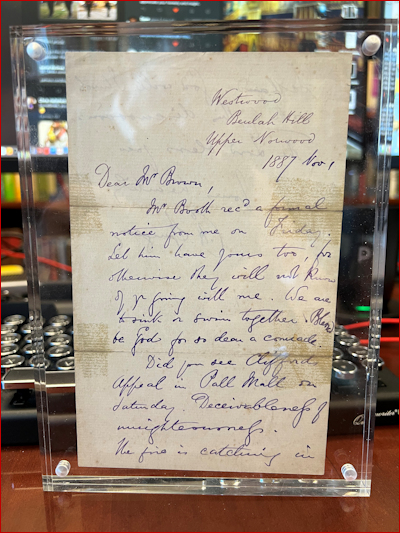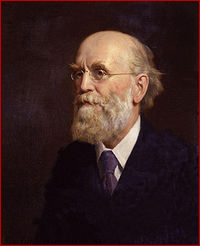
(Click for a hi-res image.)
 n October 28, 1887 (a Friday)—well into the Down Grade controversy—Charles Spurgeon wrote the Secretary of the Baptist union to withdraw his membership in the Union.
n October 28, 1887 (a Friday)—well into the Down Grade controversy—Charles Spurgeon wrote the Secretary of the Baptist union to withdraw his membership in the Union.
The following Tuesday, November 1, he hand-wrote this letter to his friend Archibald Brown, urging him to withdraw from the Union as well:
|
My most treasured item of historic Baptist memorabilia is the handwritten original of that letter. Some details about the context:
 "Clifford" is John Clifford, who had written an unctuous "Appeal to Mr. Spurgeon" in the Saturday edition of The Pall Mall Gazette. (That article is what Spurgeon is referring to in his letter to Brown.)
Clifford was serving at the time as Vice-President of the Baptist Union. A year later he would be elected president, and in that role he would preside over the Baptist Union's infamous censure of Spurgeon. In his mostly excellent biography of Spurgeon, W. Y. Fullerton charitably tries to portray Clifford as "one of Mr. Spurgeon's most ardent admirers." He was anything but. He was analogous to those who call themselves "progressive" today.
"Clifford" is John Clifford, who had written an unctuous "Appeal to Mr. Spurgeon" in the Saturday edition of The Pall Mall Gazette. (That article is what Spurgeon is referring to in his letter to Brown.)
Clifford was serving at the time as Vice-President of the Baptist Union. A year later he would be elected president, and in that role he would preside over the Baptist Union's infamous censure of Spurgeon. In his mostly excellent biography of Spurgeon, W. Y. Fullerton charitably tries to portray Clifford as "one of Mr. Spurgeon's most ardent admirers." He was anything but. He was analogous to those who call themselves "progressive" today.
When Clifford first came to London at the age of 20 in 1856, he came to the city specifically to hear Spurgeon. But even in those days, Clifford was hardly a solid Bible-believing evangelical. He was enthralled with Ralph Waldo Emerson and had seriously contemplated becoming a Unitarian. Ultimately, however, he remained at least nominally evangelical and in 1858 took a position as pastor of the Praed Street Baptist Church in London, where he remained until his retirement in 1915.
By the late 1880s, Clifford had concluded that Spurgeon and the brand of evangelical conviction he represented were oldfangled and out of fashion—and Clifford thus helped lead the modernist effort to silence Spurgeon's concerns about doctrinal down grade. Tom Nettles describes Clifford as an "irrepressible liberal. Personally, I like Spurgeon's description of Clifford's passive-aggressive approach to Spurgeon and the Down Grade: "Deceivableness of unrighteousness!"
A month later, Spurgeon wrote the secretary of the Baptist Union Council, declining the council's plea for him to reconsider his resignation. In that letter, Spurgeon said candidly, "I regard full-grown 'modern thought' as a totally new cult, having no more relation to Christianity than the mist of the evening to the everlasting hills."












2 comments:
Hi Phil,
What an amazing share. Those is the first time I am hearing about CHs decision to quit. Thanks for the share.
May God Bless ❤️
Spurgeon was a good preacher of the word. I would have loved to hear him.
Post a Comment